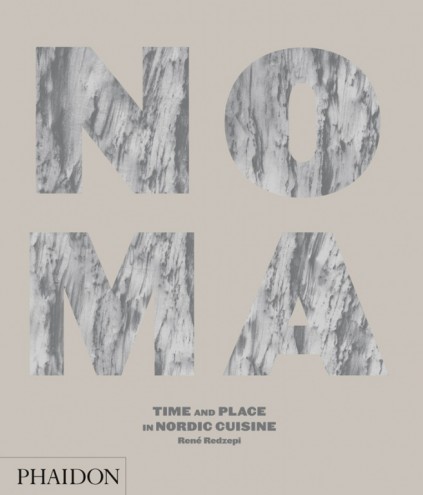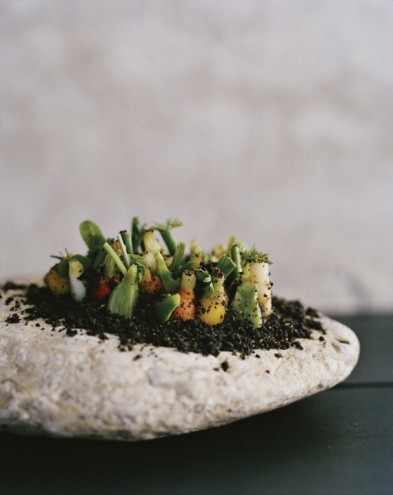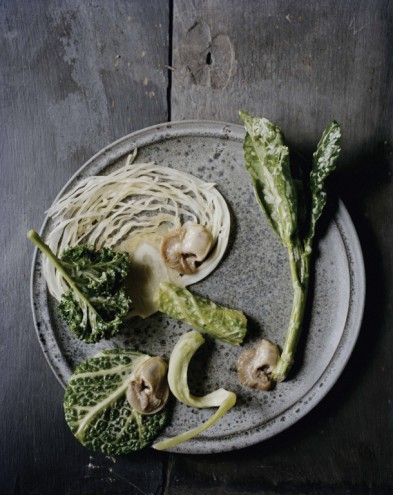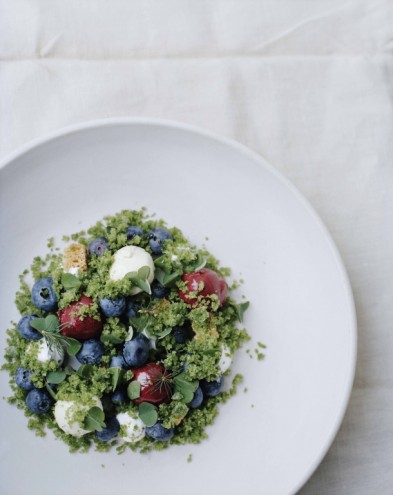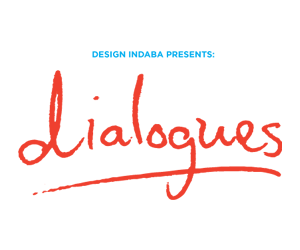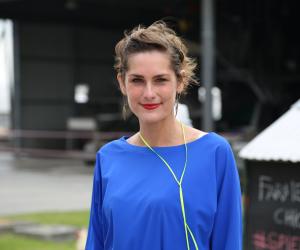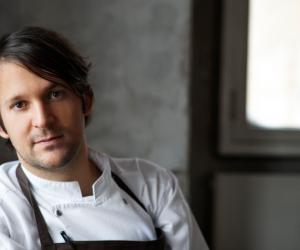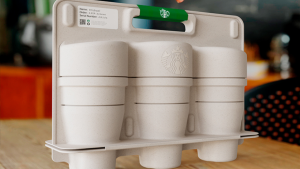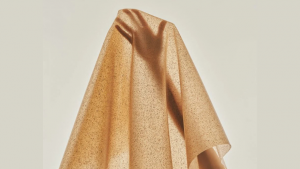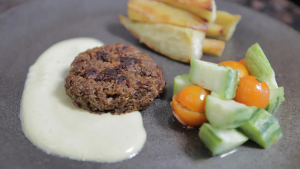Part of the Project
First Published in
Marije Vogelzang: I’m sure you must be extremely busy?
René Redzepi: I am. I never expected that the more success you have the more work you get, but I’ve discovered that it’s actually true. On the other hand, I also give myself a lot of work, for instance the MAD Foodcamp and Symposium.
Marije: I think it was a wonderful event. I really liked the roughness of it.
René: That was the whole point; it had to feel completely transparent. I wanted no pretentiousness, everything had to be focussed on the people, and be about the food, animals and ingredients. We spent all our energy and money on getting that organised.
Marije: It felt to me like such a natural extension of your ideology and I wonder if you would feel more comfortable working outside the setting of a restaurant?
René: To set a completely new challenge was very necessary for me. It’s a technique that I use a lot for things. Sometimes I do it in simple ways at the restaurant too. But a festival and symposium is something I have never been part of. I had to think not so much as a restaurant chef but a food person, somebody that knows about food. Did you have a chance to go to the symposium?
Marije: I didn’t catch it all because I was doing the Veggie Bling Bling Workshop but I have seen some things on the internet.
René: Okay good, because it was a mega success. I’ve attended tons of these things around the world, some very academic, some very focussed on the latest creations and blah blah. But the whole spirit of this was that chefs should learn new knowledge and take part in the world around them. I was so surprised how well the chefs took it. They started to understand that the more they know about the history of food, the culture that’s behind it and the latest new science, the better they will cook.
Marije: I think it is the beginning of a new era where everybody is relating to food. Even designers who never worked with food before have started thinking about and working with food because it connects to everything. It connects everybody and connects the whole system.
René: It’s true. One chef sitting there was saying: “Wow, so this means that if I change the way that I source my ingredients then I can actually help people get food in another part of the world?” It still surprises me, but the combination of all of us doing it can create a big change and that is just amazing.
I think people want this new knowledge. We go to school and learn a lot of things but we don’t learn about the implications of various types of agriculture. Some chefs argue that what we cook for is just flavour and the rest doesn’t matter, like it doesn’t matter how the food is made. But it is more than that.
Marije: So are you going to continue with this?
René: Let’s see. It’s all about money, of course. To tell the truth, we don’t want any large-scale food sponsors like food production companies. Our dream and intention is that we do it every year, and that every year we come closer and closer to this big outdoor festival where people eat and sleep, and where in the evening you can have open air movies, like relevant documentaries and shows about food.
Marije: Can you imagine incorporating a larger crossover of designers or creative thinkers, together with chefs and food people?
René: Most definitely. Every year will have a different topic. One year a theme could be something like that. Design and food go hand in hand. It’s important because you need a way to sell your ingredient, product, readymade sauce or whatever.
But also, many of the high-profile chefs are inspired by design and architecture. The way that food is being looked at now is not that different from, let’s say, the general way of looking at design. You know: straight to the point, unpretentious, very practical, and a focus on quality and clarity of materials. In many ways, that is starting to happen in food as well.
Marije: When I hear you talk about MAD Foodcamp and your excitement about its amazing connection between nature, society, education, flavour and ingredients, I wonder if you don’t feel restricted working within the setting of the restaurant? I ask this because I had a restaurant that I sold last week, because I felt really restricted by the repetitiveness of trying to have the same quality over and over again.
René: I think all restaurants and all chefs have that issue. You have this moment where everything is right, all your thoughts are new, and they create new pillars for your way of cooking and organising a team. When you have success through that you start stressing more and being less creative. I think your brain starts to become hollow because you start focussing on success. So, how do you keep yourself inspired, how do you not switch to autopilot?
Marije: Yeah, do you still feel light?
René: I know at one point that I am going to run into this. Then it will be time for me to leave the restaurant and pass on the work to somebody who can see things with a new light and a breath of fresh air. Maybe that will never happen. Maybe I will find some way to reboot constantly. As for right now, I am still filled with inspiration, I must say.
Marije: I can imagine you can still find a way that brings the restaurant guests into nature.
René: Maybe the future lies in that somewhere. But right now the restaurant theme still lies in developing the flavour. I don’t know what that sum is of all the people we are, all the ingredients we have, the culture, the history, the religion… What is the sum of all these things together on a plate? I’m still exploring that in strange and weird ways. I’m not finished; I still have a lot of energy and feel like a child searching.
Marije: It’s nice to hear that you still feel like a child and can still feel light, because I think you’re some kind of poet.
René: [laughs] I think it is important, otherwise it doesn’t make any sense to work as much as I do. I would never work as much as I do just to generate profit. It’s because it is about shaping a point of view that matters, which is very gratifying. And then I just love the fact that you’re learning constantly. That has to be my life ambition, to keep learning and teaching.
Marije: Have you ever thought about medicinal food? Do you think about the affect that the food has on your guests?
René: This is not something intentional, but a lot of people mention that their body feels great and that when they wake up in the morning, their body doesn’t have this heavy feeling. But I wouldn’t put in a specific seed just because I know that it is good for cancer or something like that, even though I’ve studied a lot of those things as a lot of the plants and the wild foods that we use are medicinal.
Marije: I did notice that at the end of the dinner, even though I’d eaten so much, I really felt very light still.
René: It’s true, even though you had about 20 dishes. I do think about things like being a human being and what our bodies process. What lives well in the stomach? What is the flavour and where are all the diverse mouth feelings? How do you end off a meal with a stomach that is balanced? So that your mind, taste buds and intellect have been challenged? So that you’re satisfied and that you’ve learnt new things, but that your stomach is also balanced? I think about that in a subconscious way. As a person that deals with food and works with taste all the time, you just do whatever feels right. You know what I mean?
Marije: Yes, it is something that you do intuitively.
You know, I was so happy to eat with my hands because suddenly you already taste the food before putting it in your mouth, by tasting it with your fingertips. Do you want to push this more in the future? Could you imagine going beyond the plate or beyond the table?
René: Absolutely. I’ve found people actually quite enjoy it. Most of them are, unlike you, provoked by it. They think they’ve paid all this money and are then asked to eat with their fingers, but then they do it and realise it comes so naturally. It awakens something in them. Of course there are those other people who just think it’s funny and completely takes the pretence out of dining. Somehow though, it breaks down all barriers once you’ve seen the person in front of you put their fingers in their mouth.
It’s like when you go to Finland. You land at the airport and two hours later you’re in the sauna with a bunch of naked men. Then two hours later you’re in a meeting room with these men, but you see them differently because you’ve just seen them naked. It’s the same when you see businessmen in front of each other eating with their fingers, looking awkward and nervous. It’s fabulous. It creates a looser, lighter mood.
Marije: Yeah, it’s really great to see people’s responses. I’m working at the moment on a project in Budapest where I’m going to have gypsy women feed you with their hands. I’m really scared because it’s quite a thing whether you want to be fed by someone that you do not know. I’m making an installation where you can’t have eye contact with each other and I think that will make it better.
René: Wow! Just the fact that I’m being fed by someone that I don’t know, that’s really crossing some boundaries. I mean, have they washed their fingers, what do they have on them? Also, it’s in Budapest and putting an extra stamp on that it’s a gypsy! In many societies that is the lowest you can get in terms of mankind… That’s crazy.
Marije: They will wash their hands in front of you. But it is very much on the edge, I agree. The women will tell you their life stories using food as a way to create understanding.
But I was wondering if you had to design an object that was non-edible, would you approach it in the same way you approach food?
René: We do design serving objects constantly. We have done this type of plate for serving oysters. We take a lot of rocks from where the oysters are found and create a setting for the oyster. In that sense, it is not a dish, but an object. These are the kinds of objects we do. Also like the pieces of wood with the flowers in the vase and the felt plates that you experienced.
Marije: I liked those. Do you think that social media is something that will change the future of chefs or food?
René: For us it’s like a newsletter. Instead of writing long newsletters once a month, it’s a constantly updated feed of what’s happening.
Marije: I was just thinking that for farmers, social media could help them connect with each other and the public.
René: It would be amazing because a lot of these farmers have no idea how to sell their products.
Marije: There are also these apps with maps of cities where people show where you can find free food in the city or in the wild.
René: There are apps that do that?
Marije: Yeah. Maybe you can start one for Denmark.
René: Another idea I have is for a company where people create contact with chefs for the farmers and contacts with farmers for the chefs. Or be the middleman: going to chefs and asking what they want, what they are missing and then finding it for them, and vice versa.
Marije: It could be a website too.
René: Yeah, where farmers would log on and say they have carrots coming into season, and chefs would see what they could get and start a conversation.
Marije: Do you think that there’s a way to incorporate normal people, beyond the chefs?
René: It could be for normal people as well. But the best thing for that is small farmer markets, in many areas of each city. It brings such a special soul and life.
Marije: Do you think that regular, non-foodie people go to markets? There are a lot of people that don’t take time for food and just buy fast things at supermarkets. Is there a way to get these people to go to real markets again?
René: The problem is that there are very few real markets. If there were more markets it would be easier to get people to buy and cook better food. People would be able to talk about the ingredients, why perhaps they are more expensive, what the benefits are of that specific ingredient and also about how to cook it.
That’s a big thing. When you’re at the supermarket and stare at a piece of red cabbage, you wonder, what you are going to do with it? I don’t have time to go home and look through 15 cookbooks. Then you ask the guy who is in charge of the green crops and he says he doesn’t know, he eats pizza every night.
Marije: [laughs] Yeah.
René: People that grow food also cook food. They know how to cook it. Because they cook what they grow, there is a whole different interaction that is better.
Marije: Do you think you will be an active part of that future?
René: Well I always thought that I wouldn’t have the time and so on. But if I think about it from my chef perspective, then I hope my sous chefs, and all the people that are eating right now in my restaurant, go out to open their own restaurants and spread the message of good food. They’re like family.
Marije: I think with the position that you have right now, you will radiate that to the rest of the world and inspire people. So you will have an influence on it whether you want it or not.

